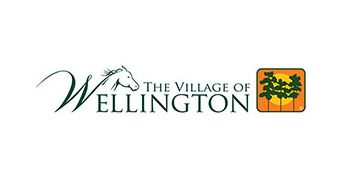Wellington sought public input on its new golf cart ordinance during a presentation by Assistant Planning, Zoning & Building Director Michael O’Dell at a virtual neighborhood watch meeting on Wednesday, Dec. 9.
Now that more 12-foot pathways are being completed or widened from their current eight-foot width, O’Dell and village staff have been charged by the Wellington Village Council to make the rounds of public meetings, including stops at several village advisory boards. Staff is expecting to present the input gleaned from these conversations to the council next spring.
O’Dell explained that the sidewalk along Forest Hill Blvd. is only five feet wide with no room to widen it. “So, currently, that will not be part of the areas where residents can operate golf carts,” he said.
The presentation included a poll asking if the participants in the virtual meeting owned a golf cart, if they thought the minimum age for operating a golf cart should be 14 years or 16 years, if they lived in a development with a homeowners’ or property owners’ association, if they support registration of golf carts and if they have a neighborhood watch group in their neighborhood.
State law makes it legal to use golf carts on local streets that have a posted speed limit of less than 25 mph, within HOAs, on a golf course or private property. Golf carts have been a source of internal transportation for local equestrians for many years.
If a golf cart is street legal, it is considered a very different vehicle. Those can be on any roadway with a posted speed limit of 35 mph or less, must be driven by a licensed driver, have a license plate and must meet other motor vehicle requirements. These vehicles are not allowed on the pathways because they are actually considered a slow-moving car.
Wellington is developing regulations to allow traditional golf carts to be used on its pathways. It has already done an engineering study, and the ordinance recommends the maximum speed on pathways not exceed 15 mph; drivers must be licensed and at least 16 years old; occupancy limitations must be followed; and the carts must have a Wellington registration sticker, which requires certain safety equipment and the signature of the owner of the golf cart acknowledging that they understand the rules.
O’Dell said that staff looked at a number of Florida municipalities.
“We wanted to try and see how people are utilizing golf carts and the regulations they have,” he said, explaining that Wellington is a unique community. “We are in a position to have considerations for what will work best for the people in the village.”
Harold Harper with the Palm Beach County Sheriff’s Office said that they are trying to come up with regulations to allow golf carts to be used within the community correctly and legally.
“The village wants to have an ordinance that clarifies what can be done legally and then educate the residents and get compliance,” he said, explaining that currently a child driving a golf cart on the roadway could be arrested, along with their parents, but the PBSO has been lenient so far. “This is a small way to make life that much better and allow people to enjoy your community by riding around in golf carts.”
O’Dell said that golf carts will not be allowed on school property. “However, the village is trying to widen the pathways so that students can be dropped off or picked up at the schools,” he said.
PBSO Sgt. Matthew DeJoy pointed out that the goal of the regulations is to lay out the rules for what people are already doing and then get compliance through education and enforcement.
“This will lead us to the path of making it possible for people to enjoy the village and allow them to use the golf carts as they would like to within the legal boundaries, so you can drive the golf cart in a responsible manner,’ DeJoy said.
O’Dell explained that the regulations will go a long way to clarifying a long-unclear situation.
“We have to adopt these [uniform] regulations in order to allow people to operate golf carts on the roadways and paths, which currently they cannot legally do,” he said.
There were few suggestions or input. Most questions from the virtual attendees were on how the plan will be implemented, the fees, fines, decal registration requirements and the like.








